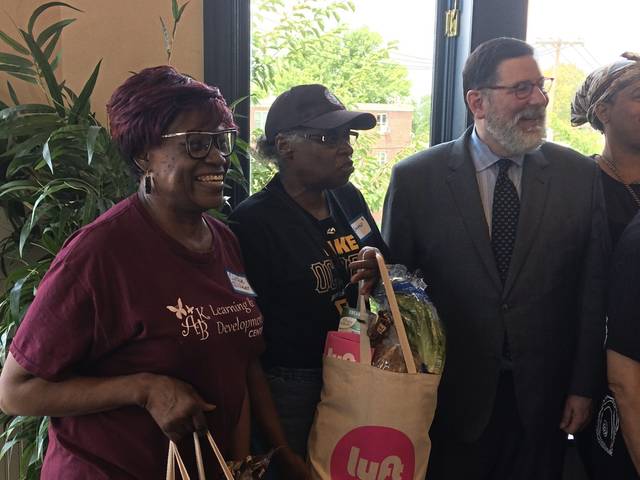Residents of Pittsburgh’s Bedford Dwellings are getting a lift from Lyft.
The ride-share service on Thursday announced it would transport residents of Bedford and those at Prospect Terrace in East Pittsburgh, both public housing communities, to and from local Giant Eagle grocery stores for $5 per round trip. Residents are eligible for one ride to the store each week.
Josh Huber, Lyft Pittsburgh’s general manager, said the service is part of Lyft City Works, a commitment to spend 1 percent of annual profits or $50 million per year, whichever is greater, on helping to make cities more livable.
“Our big push in going public [early this year] is being a public company for the public good,” Huber said. “We’re really committed to giving back to the communities that we serve.”
The Lyft Grocery Access Program is starting locally in the two public housing complexes. The company hopes to expand in the future with local support.
Caster Binion, executive director of the Housing Authority of the City of Pittsburgh, which owns Bedford, said the service is critical for residents, most of whom own no vehicle and depend on bus transportation for grocery shopping.
“It’s transformative for a community to have access to fresh food and the opportunity to have transportation door-to-door,” he said, adding that the program would help eradicate hunger in public housing. “The entire community benefits.”
Lyft is partnering with HACP, the Allegheny County Housing Authority and 412 Food Rescue to provide the program with no government subsidy.
Mayor Bill Peduto said it would help solve Pittsburgh’s problem of having more than 40 percent of the population living in “food deserts,” areas without close access to a grocery store.
“For $2.50 you get picked up at your home and you’re taken directly to the grocery store, you buy as much groceries as you need, and for $2.50 you’re brought back,” Peduto said. “Forty-seven percent of the people who live in the city live in a food desert, meaning they don’t have access to food, and nearly one out of every four city residents don’t have access to a car. It’s an absolutely critical need that Lyft is helping to fill.”
The mayor said the city would next work on helping residents with similar round-trip transportation for medical care.
“Access to health care is definitely the next step,” he said, adding there are no current plans for doing that.
Huber said Lyft consulted with local officials and residents to learn Pittsburgh’s most pressing needs before starting the grocery program.
“Honestly, it’s just hearing from our communities on what’s impacting them,” he said. “It’s clearly an issue here. This was a way for us to have a big impact.”








